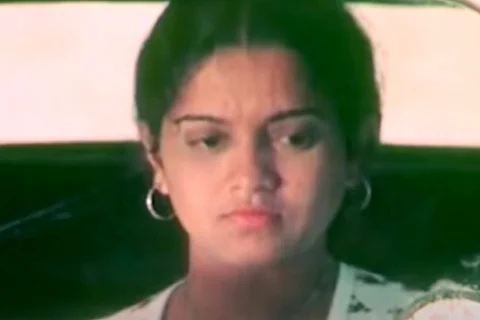

The 1950s were a defining time for the Indian cinema industry. The New Indian Cinema movement, inspired by Italian Neorealism, first began in West Bengal with filmmakers such as Satyajit Ray and Mrinal Sen making films that presented the reality of the prevalent sociopolitical climate. The flames of parallel cinema soon engulfed the rest of India. ‘Kannada Bheeshma’ GV Iyer was one of the earlier Kannada parallel cinema filmmakers.
Ganapathi Venkataramana Iyer has a legion of esteemed awards to his name. Iyer’s films always circled around the theme of spirituality. However, Nalegalannu Maduvavaru (The Ones Who Will Build the Future) stands out in his filmography. The film, which released in 1976-1977, moves away from the realm of spirituality and explores rationality. While it is not devoid of spiritual elements, it juxtaposes the two.
Sharada (Rekha Rao), seeking the whereabouts of Kareem, her partner, visits his friend Jay’s clinic. As she waits, a priest enters the clinic. “You never know with these Christians. Once they touch anything, they contaminate it and only a dip in the holy water of Ganges can rid us of it,” says the priest to the doctor, reflecting the prevalent animosity towards minority communities.
The leads, Sharada and Jay, come off as rational beings until Iyer begins to explore their relationship, which is often clouded by others’ opinions. Jay has always despised the relationship that Sharada and Kareem had, before they eventually broke up. “I will take good care of you, please have trust in my abilities,” says Jay, before marrying Sharada, although the tables turn after they wed. Jay starts caving to pressure, influenced by whatever people say. His displeasure heightens when she doesn’t comply with his wishes.
However, unlike them, the next generation is not subservient. The focus of the narrative shifts from the couple to their children, Ranga and Balu. While Ranga is an established author and a literature enthusiast, Balu is a psychology geek. Jay’s niece Archana comes to live with them, and all three are very rational people who look at life from a logical lens, detached from societal norms and expectations.
“I don’t want to live a conventional life. I want to date different men, and then if I feel like getting married and having kids, I’ll do that too. Anyway, all love ends in sex. That’s why I want to experience what it feels like; I am inquisitive,” says Archana, as she speaks to Balu about her opinion on marriage, love and relationships.
Iyer’s direction unravels themes on love, relationship, marriage and the taboo subject of premarital sex. Known for his Sanskrit films, he broached these subjects in the conservative '70s. What makes the viewing interesting is that he doesn’t offer a commentary himself, but has rather shot the film as if he were in the audience, watching the story unfold from the sidelines.
“Your mother was a strong woman but her dependence on her husband is what made her suffer for so long. Ranga and I don’t have such a relationship. Even in his absence, I can raise the child by myself,” Chithra, who is pregnant with Ranga’s child, says to Balu and Archana. Asserting their difference from the previous generations, their needs are not materialistic but metaphysical in nature.
The dialogue paves a way for the discourse of rationality versus spirituality to be viewed with a new lens. Iyer asks the audience to decide whether being spiritual is dependent on reciting hymns and scriptures, as Jay does, or is it being truly free of all materialistic comforts and surrendering to your rationale.
By discussing modern ideas of exploration, romance, sexual relationships and marriage, while challenging the audience’s notion of spirituality and rationality, the film holds up a mirror, compelling viewers to search within themselves for answers. All of this makes Nalegalannu Maduvavaru worth revisiting. The film can be watched on YouTube here.